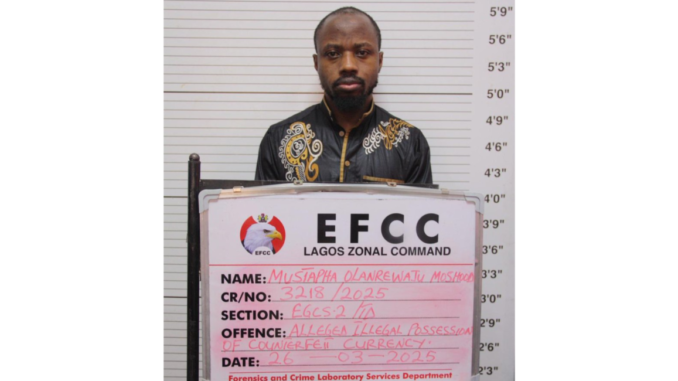
The EFCC alleged that the defendant was found in possession of 98 counterfeit $50 United States dollar notes.
The Lagos zonal directorate 1 of the Economic and Financial Crimes Commission (EFCC) has arraigned one Moshood Mustapha Olanrewaju before the Federal High Court in Ikoyi, Lagos, over alleged possession of counterfeit foreign currency totaling $4350.
Olanrewaju was brought before Justice Yellin Bogoro on Thursday, April 10, on a four-count charge bordering on currency counterfeiting.
The EFCC alleged that the defendant was found in possession of 98 counterfeit $50 United States dollar notes.
One of the charges against him states that Olanrewaju, in January 2025, was found in possession of 21 pieces of fake $50 bills, totalling $1050, all bearing various serial numbers, including MB61754676C, MB61754979C, and MB61753363C.
According to the EFCC, the defendant knew the notes to be counterfeit, thereby violating Section 5(1)(b) of the Counterfeit Currency (Special Provisions) Act, Cap C35, Laws of the Federation of Nigeria, 2024, and is punishable under Section 5(2) of the same Act.
Another count alleges that Olanrewaju was in possession of an additional 26 pieces of counterfeit $50 notes, amounting to $1300, also with distinct serial numbers.
The total amount allegedly found in his possession is $4350, made up of 98 fake $50 bills.
When the charges were read, the defendant pleaded not guilty.
Following his plea, prosecuting counsel, Zeenat Atiku, requested the court to fix a date for trial and to remand the defendant in the custody of the Nigerian Correctional Service (NCS) pending the commencement of proceedings.
In response, the defence counsel asked for a short adjournment to enable the filing of a formal bail application.
Justice Bogoro granted the prosecution’s request and adjourned the matter until June 9, 2025, for trial.
The court further ordered that the defendant be remanded in the custody of the NCS until that date.
The EFCC reiterated its commitment to combating financial crimes and safeguarding the integrity of Nigeria’s financial system.
Leave a Reply